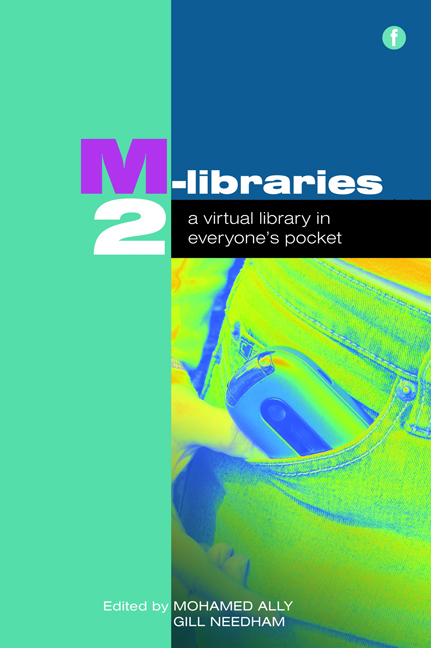Book contents
- Frontmatter
- Contents
- Acknowledgements
- Contributors
- Foreword
- Introduction
- PART 1 M-LIBRARIES: DEVELOPMENTS AROUND THE WORLD
- PART 2 TECHNOLOGY IN M-LIBRARIES
- PART 3 APPLICATION OF M-LIBRARIES
- 12 Mobile access for workplace and language training
- 13 Service models for information therapy services delivered to mobiles
- 14 Health literacy and healthy action in the connected age
- 15 ‘Ask us upstairs’: bringing roaming reference to the Paley stacks
- 16 The role of an agent supplying content on mobile devices
- 17 Portable science: podcasting as an outreach tool for a large academic science and engineering library
- PART 4 M-LIBRARIES AND LEARNING
- PART 5 BUILDING THE EVIDENCE BASE FOR M-LIBRARIES
- Conclusion
- Index
14 - Health literacy and healthy action in the connected age
from PART 3 - APPLICATION OF M-LIBRARIES
Published online by Cambridge University Press: 08 June 2018
- Frontmatter
- Contents
- Acknowledgements
- Contributors
- Foreword
- Introduction
- PART 1 M-LIBRARIES: DEVELOPMENTS AROUND THE WORLD
- PART 2 TECHNOLOGY IN M-LIBRARIES
- PART 3 APPLICATION OF M-LIBRARIES
- 12 Mobile access for workplace and language training
- 13 Service models for information therapy services delivered to mobiles
- 14 Health literacy and healthy action in the connected age
- 15 ‘Ask us upstairs’: bringing roaming reference to the Paley stacks
- 16 The role of an agent supplying content on mobile devices
- 17 Portable science: podcasting as an outreach tool for a large academic science and engineering library
- PART 4 M-LIBRARIES AND LEARNING
- PART 5 BUILDING THE EVIDENCE BASE FOR M-LIBRARIES
- Conclusion
- Index
Summary
Introduction
Information technology innovation is opening a wealth of opportunity for educators and health information providers to improve learning, leading to personal and social good. In the case of education, that might be success in course completion and preparedness for professional training. In the case of health education, that might lead to improved individual health literacy, changed attitudes to health and, ideally, health behaviour change. The opportunity is to do learning better, and not only to impart knowledge but also to crack the nut of supporting change for improved health behaviour. New technologies offer vast opportunities to push people into establishing new, healthy behaviours. They also beg new questions, choices and challenges.
■ How can we harness the enormous power of the world of information plenty?
■ What structures/platforms will deliver it most effectively and safely?
■ How can we minimize cost, while bringing along the professionals (teachers, librarians, clinical professionals)?
■ How can we ensure that we do good and not harm?
Opening the gates to health knowledge
The technological march underlines an urgency for reflection among knowledge specialists. Prior to the turn of the century, library services gathered knowledge in a world of knowledge scarcity. The mission was the equitable provision of scarce information, learning and thought; the challenges were that provision was severely limited in time and place. In effect, libraries have been the gatekeepers to knowledge, performing rationing in a world of scarcity. In parallel, doctors, particularly primary care clinicians (in the UK) have had the role of gatekeepers to health care and, to a large degree, of gatekeepers to health knowledge. Doctors have been custodians of scarce medical knowledge, both specific to individuals and to general knowledge about illness. The greatest disadvantage of the era of large book and periodical collections was perhaps the inequity of access to knowledge. Inevitably, the less-privileged in society had the least access. The greatest advantage of the large physical collections was perhaps that there was relatively little problem of provenance. New information had to have institutional/societal acceptance. The same issues applied to health when the doctor knew all that there was to know and there were no other sources of health information: health knowledge was definitive, if not universally available.
- Type
- Chapter
- Information
- M-Libraries 2A virtual library in everyone's pocket, pp. 137 - 144Publisher: FacetPrint publication year: 2010

